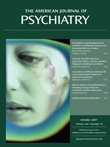To The Editor: As a pediatric psychologist who works at Massachusetts General Hospital, I read with interest the treatment in psychiatry article by Samuel R. Chamberlain, M.A., et al., in the April 2007 issue of the
Journal, entitled “Lifting the Veil on Trichotillomania”
(1) . The report by Dr. Chamberlain et al. supports my observations from my extensive clinical experience working with children and teenagers suffering from trichotillomania. Cognitive behavior therapy (CBT) consistently shows positive results, and medication often does not demonstrate significant benefits.
If there is an underlying mood or anxiety disorder that contributes to hair pulling, or if CBT alone has failed, then medication—usually a selective serotonin reuptake inhibitor (SSRI)—in addition to CBT, is often most successful. However, most of the patients in my practice have not presented with an underlying mood or anxiety disorder. Certainly, individuals with trichotillomania may pull their hair when they are anxious, but they usually pull more often when they are in a state of relaxation. Hair pulling for them is a self-soothing behavior, not unlike thumb sucking, which becomes habitual. It can be very difficult to target with medication, and, if there is even a minor side effect of activation, medication could make the hair pulling worse. When CBT is initiated and patients begin to experience a decline in their hair pulling, they will often choose to taper off their medication. They frequently report that medication has no effect, positive or negative.
For children and teens with trichotillomania, an initial comprehensive evaluation is warranted in order to rule out any comorbid conditions that may contribute to the hair pulling. If there is an underlying mood or anxiety disorder, then these patients may indeed represent a subgroup in which hair pulling responds to medication. Intensive CBT of habit reversal training, with parental involvement, is very hard work for the patient, and both motivation and mood stability are crucial in providing an optimal opportunity for CBT to be effective. If the trichotillomania is severe and there is no significant response to CBT, then medication may be indicated to strengthen the patient’s ability to apply CBT.
The first line of treatment, however, should be comprehensive, CBT, habit-reversal treatment, not medication, in order to work toward extinguishing the pulling behavior. Medication should be used cautiously, and if there are no signs of improvement or a worsening of symptoms, consideration should be given to the discontinuation of medication and strengthening of CBT.
Trichotillomania causes tremendous pain for those who sufferer from the disorder as well as their families. Certainly, more research in this area is needed given the complexity, comorbidity, and range in severity of the disorder. A multi-modal approach should be emphasized.

